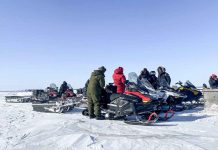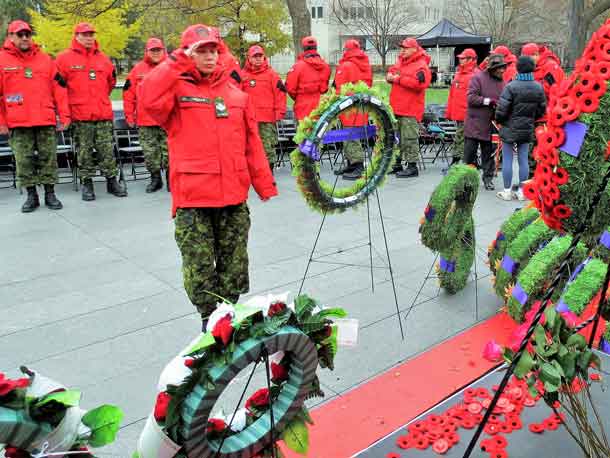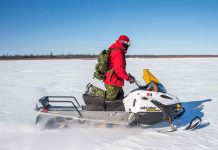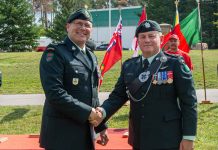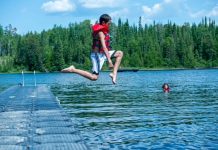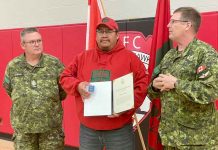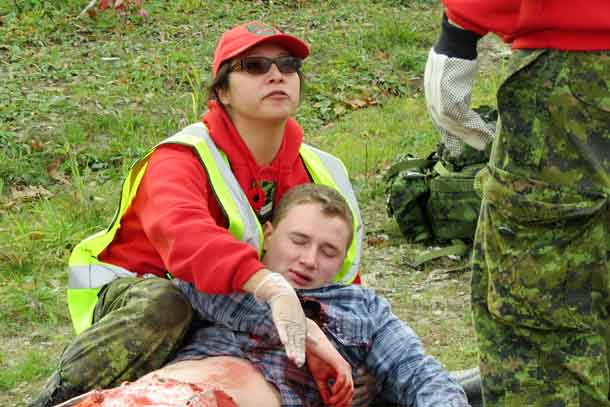
By Peter Moon
THUNDER BAY – Arriving in the dark at night to find five badly injured men screaming with pain at a motor vehicle accident proved a challenge for many Canadian Rangers during a week-long, military collective training exercise.
The mock accident was part of Exercise Tracker Ranger, an annual event iatwhich Rangers receive specialized training and are tested on their skills, particularly in search and rescue techniques. A total of 49 Rangers from 18 First Nations from across Northern Ontario completed the training at the 4th Canadian Division Training Centre at Meaford, near Owen Sound.
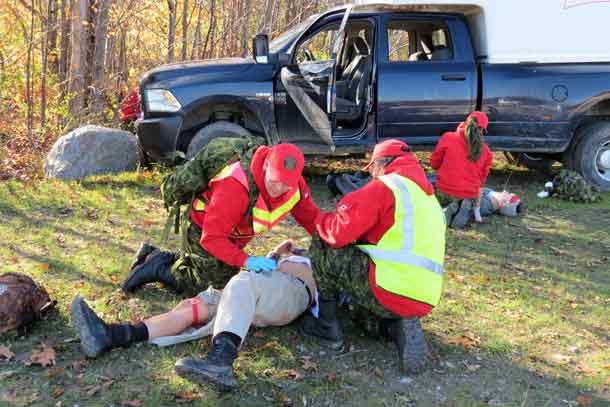
Their instruction consisted of extensive training in first aid, the use of map and compass, low angle rope rescue, and dealing with mass casualties. They received classroom instruction before being tested in small teams in a variety of challenging field exercises, both at night and in daylight.
For many of the Rangers their most challenging test was dealing with the crash site injuries. Many reacted with shock after they were taken to an isolated part of the training centre at night and arrived unexpectedly at a simulated but very realistic crash site. With only small headlamps for illumination, they had to assess the injuries, treat them, and carry the casualties to a nearby area for evacuation by helicopter.
The victims, five soldier volunteers, had lifelike injuries, ranging from minor to life threatening, and they acted their parts convincingly.
“The most difficult part of the training was the night time exercise,” said Corporal Darlene Beardy, a Ranger for 14 years from Bearskin Lake First Nation. “We weren’t expecting what happened when we got there, seeing actual people in the dark who were very real looking casualties. They were screaming and everything and, I’m not going to lie, I panicked once I got to a casualty. I just stopped. I didn’t get in there to help right away.
“The next day we had the same kind of scene in the day time and I was ready for it. I knew what to expect and what I needed to do. We all jumped into it. We were ready. We’d learned. This is something that will stay with me. I’m not going to forget it.
”It’s been a busy and tiring week but it’s been a great experience and I’m taking home with me what I’ve learned and experienced here.”
The mass casualty training is of real value tor the Rangers, said Warrant Officer Carl Wolfe, an army instructor. “There are not many resources in the small First Nations of Northern Ontario,” he said. “The Rangers could encounter mass casualties at any time, in situations such as a plane crash or whatever and wherever, and this will help them to be ready.”
Captain Caryl Fletcher, the officer commanding the Rangers of Northern Ontario, said the skills the Rangers acquired during the training will go back with them to their home communities and be passed on to other Rangers.
“It was a very successful course,” he said. “Not just for the new skills the Rangers learned, and being able to hone their existing skills, but this is the annual activity when they are able to get together and interact with Rangers from other patrols. They get to learn lessons those other patrols have learned over the past year, such as handling search and rescue operations in their communities. They take home a lot.”
Ranger Percy Suganaqueb, from Webequie First Nation and a Ranger for one year, said he found the training and the field exercises demanding. “It’s been a pretty good learning experience,” he said. “It’s been fun but tough and hard with long hours. When I make mistakes I try to review my mistakes and learn from them and improve. I’ve made a lot of mistakes here but I’ve learned a lot. I’m taking it home with me.”
(Sergeant Peter Moon is the public affairs ranger for the 3rd Canadian Ranger Patrol Group at Canadian Forces Base Borden.)

